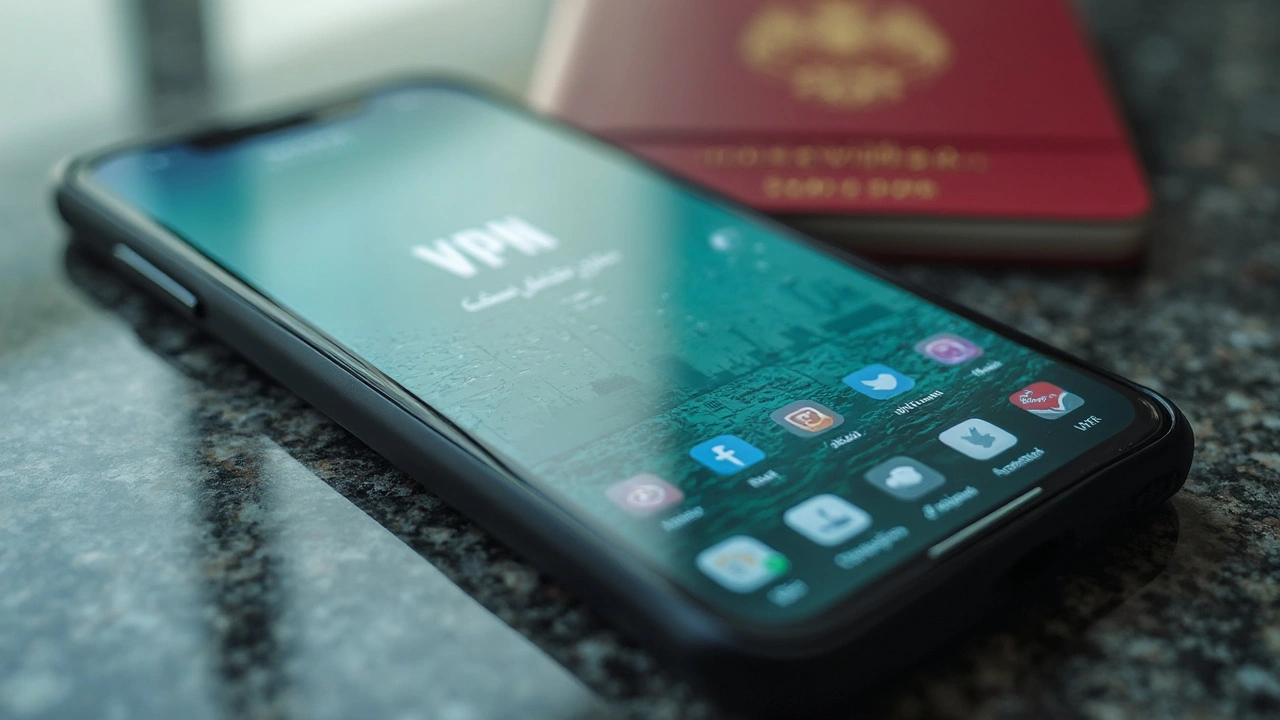
It might surprise you, but if you land in Dubai planning to use WhatsApp calls, Facetime, or even Telegram for work or personal chats, you’re going to hit a wall. Voice and video calls on WhatsApp, Messenger, FaceTime, and similar services are officially blocked. Even Snapchat video chat has trouble. The authorities have set strict controls on VoIP services, so while you can text and send pictures on these apps, any call feature just won’t work as you expect.
Why? The government says it’s about security and keeping telecom profits inside the UAE. But for escorts, business travelers, and tourists, this means everyday communication gets way more complicated. Things that work smoothly in Europe or the US just don’t in Dubai. Don’t assume you can always count on the apps you use at home. You’ll want to know reliable alternatives before you arrive so nothing messes up your plans, business, or personal life while in the city.
- Apps Commonly Banned in Dubai
- Why Dubai Restricts Certain Apps
- How Escorts and Visitors Communicate
- Popular Workarounds and Risks
- Tips to Stay Out of Trouble
Apps Commonly Banned in Dubai
Dubai is pretty strict about digital communication. You can text on most platforms, but once you try to make a call, you’re more than likely to run into a block. The biggest ones that everyone talks about are WhatsApp calling, FaceTime, Skype, Viber, and Snapchat video/voice calls. Even Zoom has had connection issues in the past, especially during school shutdowns, though it’s usually open for business use now. Want to call home, make video dates, or connect privately with clients? These bans make that tough.
The rules don’t just hit the big international names. Even apps like Telegram voice/video calls and Facebook Messenger calls are not available. Texting? No problem. But making a voice or video call is just a no-go—unless you’re using a local telecom-approved app. There’s a real line between what’s legal and blocked, so don’t assume your apps from home will just work after you land.
- WhatsApp calling: Blocked (texting and images work)
- Skype: Blocked for both calls and video chats
- FaceTime: Blocked
- Facebook Messenger calls: Blocked (chatting works)
- Viber: Blocked (messaging works, but calls don’t)
- Snapchat video chat: Blocked
- Telegram voice/video: Blocked
But here’s something lots of newcomers miss: Dubai allows local apps for calls, but they’re not free. Popular choices include BOTIM and C’Me, and both require a paid subscription from your UAE mobile provider. Not super convenient if you’re just visiting or don’t want to share your ID details.
Here’s a quick breakdown of what’s currently banned, vs. what works for messaging only:
| App Name | Text Messaging | Voice/Video Calling |
|---|---|---|
| Yes | No | |
| Skype | Yes | No |
| FaceTime | N/A | No |
| Viber | Yes | No |
| Messenger | Yes | No |
| Telegram | Yes | No |
If you’re counting on your usual tools to keep in touch with colleagues or clients—or just want to avoid getting caught unprepared—make sure you’re up to speed on these banned apps before you land in Dubai. It’ll save you a ton of frustration, especially if you’re in the escort industry, where private and reliable communication is key.
Why Dubai Restricts Certain Apps
Dubai keeps tight control on internet services, especially when it comes to apps that let you make calls or share private messages. The main reasons are security, legal rules, and protecting money that local telecom companies make. Since the UAE is big on public safety and surveillance, unmonitored internet calls or encrypted messaging apps are seen as potential risks. Local laws even ban some types of online behavior that are totally normal elsewhere.
Now, here’s the money angle. The two main telecom operators in the UAE—du and Etisalat—offer their own paid internet calling services. By blocking free calls on apps like WhatsApp or FaceTime, the country nudges everyone to use these approved services instead. It’s a way to keep the cash flowing to companies within Dubai.
If you’re thinking about what’s actually blocked, here’s a handy breakdown:
- WhatsApp voice and video calls
- Facetime
- Skype and Skype for Business
- Viber
- Facebook Messenger calls
- Snapchat's voice and video chats
- Telegram calls (not normal messages)
The law goes beyond just making things hard for end users. Dubai’s Telecommunications Regulatory Authority actively monitors and restricts these services, and using VPNs to work around blocks is technically illegal if you use them for banned activities.
To see the impact, just look at how much the country relies on telecom revenue:
| Company | Annual Revenue in 2024 (USD) |
|---|---|
| Etisalat | $14.1 billion |
| du | $3.5 billion |
Staying on the right side of Dubai's communication laws means knowing these facts. If you plan to work as an escort or visit, you’ll have to get creative with how you keep in touch, since Dubai app ban policies are stricter than most people expect.

How Escorts and Visitors Communicate
Not being able to make WhatsApp calls or use FaceTime in Dubai can be a pain, especially if you’re working as an escort or relying on these apps to connect with friends or clients. Still, people in the know find workarounds. Messaging works almost everywhere—WhatsApp, Telegram, and Signal let you text and share photos without issues. The big block is on voice and video calls.
So, how do people actually talk? The answer is local apps and alternative communication platforms. The UAE has its own approved messaging apps, like BOTIM and C’Me, that actually let you make voice and video calls if you sign up. These apps are legal, they work, and they’re available for download from regular app stores.
If you’re an escort or visitor, here’s what tends to work for staying in touch:
- Stick to texting on WhatsApp or Telegram. Voice calls get blocked but regular messages go through just fine.
- Download and register on approved apps like BOTIM or Voico UAE if you need to make calls. You’ll need a local SIM card or eSIM for full features.
- Some people use international roaming if visiting briefly, but it gets expensive and still doesn’t always fix call blocks.
- Most escort bookings and discussions happen by message first. Only when both sides are comfortable do they usually ask to connect on a legal calling app or meet in person.
Here’s a quick look at which apps do what in Dubai right now:
| App | Messaging | Voice Calls | Video Calls | Legal to Use |
|---|---|---|---|---|
| Yes | No | No | Yes (but calls blocked) | |
| Telegram | Yes | No | No | Yes |
| Signal | Yes | No | No | Yes |
| BOTIM | Yes | Yes | Yes | Yes |
| FaceTime | No | No | No | No/Blocked |
It helps to know that using a VPN to get around these blocks is risky and illegal in Dubai. Getting caught can mean big fines or worse. If you’re planning to stay longer, grab a local SIM, stick to legal, approved apps for all calls, and always check updates since the rules can change fast.
Popular Workarounds and Risks
When you realize your favorite calling apps won’t work the moment you touch down in Dubai, you’re not alone. Loads of people, including escorts and travelers, look for ways to get around these bans. The usual go-to? VPNs (Virtual Private Networks). VPN apps are easy to find and set up, and they let you make WhatsApp calls, Telegram chats, and even Facetime work—most of the time. But before you hit that download button, here’s the catch: the UAE has strict laws about using VPNs, especially if you’re bypassing bans on purpose.
According to a 2024 report by the UAE Telecommunications and Digital Government Regulatory Authority, it’s technically legal to use a VPN for streaming or privacy, but not to break local laws or access banned services. If you’re caught using a VPN to access Dubai app ban targets like WhatsApp calls, you could face a fine of up to 2 million AED (that’s around $545,000 USD!). The authorities mainly target big-time violators, but anyone breaking the law is at risk.
"The most common mistake visitors make is thinking VPNs are completely safe to use. In reality, using a VPN to access banned services is a legal risk, and the penalties are no joke." — Emirates Law Journal, March 2025
Apart from VPNs, people try using lesser-known messaging apps or paid international calling services. Apps like Botim and C’Me are actually licensed by the UAE and work for voice and video calls, but you’ll often need local phone numbers and sometimes a subscription. Online escort services face other hurdles since advertising and listing are strictly watched—a lot of platforms block UAE-based users entirely.
Let’s break down the numbers for how people deal with these bans:
| Method | Can Be Detected? | Legal? | Used By |
|---|---|---|---|
| VPN for Calling Apps | Sometimes | No | Foreigners, some locals |
| Official UAE Calling Apps (Botim, C'Me) | No | Yes | Residents & Visitors |
| International Prepaid Call Services | No | Yes | Business, tourists |
Bottom line: VPNs look tempting, and a lot of people use them, but getting caught isn’t worth the gamble. Stick with licensed apps for calls. If you’re in the escort business, don’t risk advertising, chatting, or sharing sensitive info on banned platforms. Stay smart—cheap workarounds can end up costing you big if you’re not careful.

Tips to Stay Out of Trouble
Dubai doesn’t mess around when it comes to digital laws, so it’s smart to play it safe and avoid headaches. Using banned apps for voice or video calls, or for arranging anything private, can land you with serious fines or even jail. Here’s what actually works to keep you under the radar and problem-free.
- Don’t try illegal workarounds. Authorities can detect VPN use, and if you’re caught using a VPN for banned apps, you risk large fines. The UAE updated its cybercrime law in 2021, making fines for illegal VPN use go up to AED 2 million (around $540,000).
- Stick to approved communication apps. The few legal VoIP options in Dubai are Botim, C’Me, HiU Messenger, and Voico. These are monitored and regulated, but they work, and you won’t get fined for using them. If you need to call family, these are your best bet.
- Avoid discussing or sharing adult content digitally. Even sent over text, this can trigger charges for "public indecency" and "promotion of immoral content." Dubai takes this seriously and watches public and private digital spaces strictly.
- If you use WhatsApp, only send texts or photos—never try to make calls. You’ll notice the call just doesn’t connect, but some people keep trying, risking more attention if they try to force it by technical means.
- Delete sensitive chats or images from your phone. There have been real cases of tourists and expats checked during random stops or at airports. If authorities scan your phone and find adult content or arranging info, penalties can be severe.
If you’re curious about the actual risks, check out the stats table below, based on UAE government records and local news reporting:
| Offense | Penalty Range (AED) | Jail Time | Notes |
|---|---|---|---|
| Using banned VoIP apps | 50,000–2,000,000 | Up to life for repeat offenses | Includes illegal VPN use |
| Sending/receiving adult content | 250,000–500,000 | 6 months–3 years | Even for private texting |
| Engaging in escort work online | 500,000–1,000,000 | Up to 5 years | Arranging or promoting services online is illegal |
Bottom line? Dubai is not a place to bend the digital rules. Always double-check your apps before you travel. Use only official and allowed tools. And remember, privacy is never guaranteed, so think before you type or share anything sensitive. Staying safe is way easier than dealing with legal trouble later.
Dubai Escort